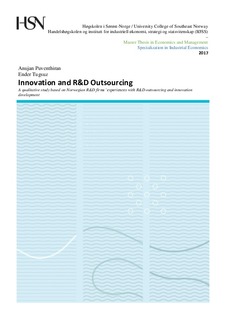| dc.description.abstract | The purpose of this thesis is to find out the criteria behind firms’ decision to outsource the R&D function, and the factors that support/constrain their goal of enhanced innovation. In order to cater the market changes and the technological development, many firms chose to focus plenteously on core functions such as R&D. R&D emphasizes processes that can contribute to innovation development, and the driving-force behind this trend is that there is a rising awareness on that innovation and knowledge associated with R&D, is created outside a firm’s own boundaries. Outsourcing R&D has shown to improve innovation and overall firmperformance, but only if it is properly planned and executed. Based on an intense literature review within this topic, we have managed to form these following research questions:
- What criteria underpinned firms’ decision to outsource R&D?
- What factors support or constrain firms from meeting their goal of enhanced innovation?
To answer these questions, we conducted a qualitative study consisting of seven comprehensive interviews. In order to retrieve valuable and reliable information, these interviews were made with central representatives from various R&D firms in Norway. The information we retrieved from these interviews were analyzed and discussed with references to literature. Based on theoretical and empirical evidence, the criteria behind the decision to outsource R&D were primarily based on a firm’s competency, resource and flexibility (time and adaptation). Generally speaking, both theoretical- and empirical evidence shows that firms who outsourced R&D, gained better advantages in terms of innovation development.
However, too much dependency on outsourcing could inhibit a firm’s ability to acquire knowledge and experience related to the issue they are trying to resolve. Regarding the second research question, our informants suggested internal innovation-networks, sharing culture, financial support, encouragement of risk-taking, and cooperation between specialists and firms as innovation enhancing factors. The factors that constrained innovation was overoutsourcing the R&D function, down-prioritizing internal development, financial barriers, and bad communication between the parties. According to our findings, these constraints can significantly inhibit innovation development. Separate from the research questions, we discovered some additional findings such as noninnovative motives behind R&D outsourcing: E.g.: business-models, cost-savings and development of non-innovative products and services. Additionally, the informants had highly optimistic predictions on the importance of R&D in the future, and expected the market for outsourcing to be even greater. | nb_NO |
